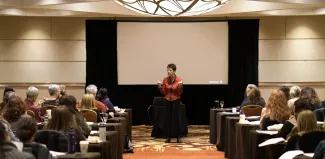Founder of The Center
I’m Deany Laliotis and I am passionate about the power of EMDR therapy to transform lives. Since 1993, I had the privilege of working very closely with Dr. Francine Shapiro, the originator of EMDR, and was mentored by her until her death in 2019. I was the Director of Training for EMDR Institute Inc., the program developed by Dr. Shapiro that trained clinicians all over the world in EMDR therapy. Together with my husband, Dan Merlis, also on the faculty of EMDR Institute, we trained thousands of EMDR therapists over the years in this comprehensive approach to healing trauma. I learned from Dr. Shapiro the importance of ensuring that all therapists have access to this highly effective treatment modality. For me, that translates into delivering a high quality training experience through The Center to insure that our trainees are successful at integrating their EMDR training into clinical practice.

EMDR is an Integrated Psychotherapy for Transformational Healing
I travel all over the US and abroad, teaching therapists how to apply EMDR therapy as a comprehensive relational approach. I focus on the treatment of complex developmental trauma, healing wounds of attachment and the importance of the therapeutic relationship that creates the conditions that make healing possible. In this EMDR video tutorial, I unpack all the elements that are part of EMDR therapy—attachment theory, somatic processes, parts work, affective neuroscience, and more. Then I explain how they work together with EMDR to offer clients transformational healing that lasts.
Trainees Asked. Deany Laliotis Answers.
Over the years, my trainees have told me that they struggled to find an EMDR training program that adequately prepared them for treating more complex and challenging clinical presentations. Nor could they find other EMDR trainings that emphasized EMDR as a comprehensive approach for treating a broad range of common issues that clients bring into their practices every day. After their EMDR training with me, therapists not only understand the power of this evidence-based approach, they also appreciate the art as well as the science of this approach, and are better able to tailor this robust methodology to best meet their client's needs. They also appreciate how EMDR therapy is integrative- it's compatible with all major psychotherapy approaches—cognitive behavioral, psychodynamic, somatic, and experiential. So, our EMDR training isn't just about learning protocols and procedures; it's about working holistically to help our clients grow and change beyond symptom relief.
Personal Growth and Professional Development
EMDR training is about helping our clients approach an emotional territory that is painful and unfamiliar. As therapists, we co-create the conditions that make healing possible, often for the first time. In order for our clients to go there, we need to accompany them in their journey. We teach therapists the importance of being present, of being attuned to the client's experience moment to moment, and to have the very courage we are asking our clients to have. So, EMDR training is also an opportunity for us as therapists, to grow and develop so we can bring our best selves to our work with clients.
Introducing the Center for Excellence in EMDR Therapy Training
It was my trainees' enthusiasm for my approach and their expressed desire for a path to personal as well as professional development that inspired me to establish The Center for EMDR training and EMDR certifications. The Center offers a complete continuum of EMDR trainings—from EMDRIA-approved basic trainings to a continuum of advanced courses, case consultation, and a Master Certificate in Relational EMDR Therapy℠.
Learn More About Deany's Philosophy on Mentorship
No one gets to where we are alone. If we're fortunate enough to encounter people in our lives that see something special in us and take us under their wing, we can rise to the challenge. Francine Shapiro was that person for me. She embodied the courage as well as the vision to create a pathway to healing that revolutionized therapy and how we understand change. As ambassadors of this model, it is both a privilege and a responsibility to pay it forward and share our learning with others. By teaching it, we continue to grow as therapists and mentors.
Here's what a fellow trainer says about Deany:

